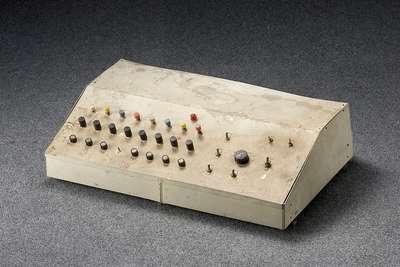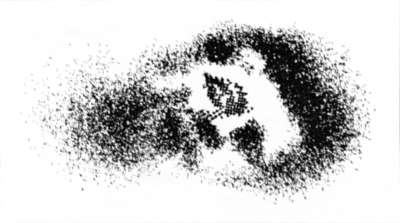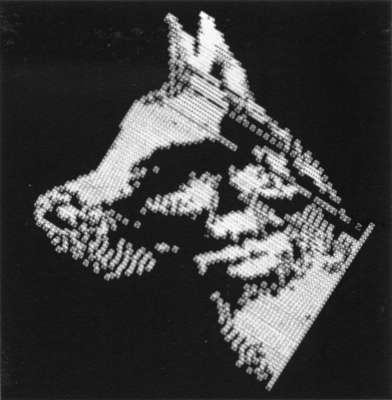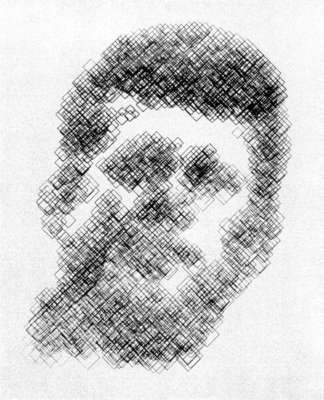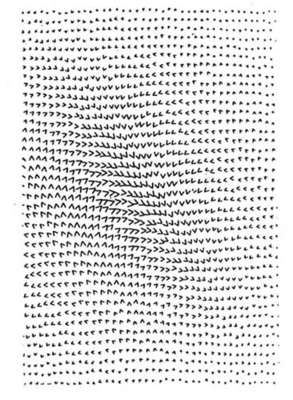Masao Kohmura was the founder of the CTG Japan, a student group which was active in the 1960s producing seminal works of Computer generated art. The CTG halted producing works by 1969 and only Kohmura remained active as an artist using computers. He later became an influential art professor in Japan. In the CTG days Kohmura utilised computer generated random numbers as a way to investigate all possibilities by using an algorithm to meet the needs of his grammar of creation. After CTG, he shifted to an idea of making exhaustive listings. Kohmura claims that the space of art becomes finite when you consider it in the digital space.
Kohmura claims that the digital realm is synonymous with the realm of language. When Kohmura got a teaching position there was no model for teaching media art or computer graphics in Japan therefore he started by outlining an attitude for getting along with the medium named computer. He taught art students programming as an expressive tool, and understanding computer media by consulting his own experience. Kohmura believed that all students should learn programming in practice regardless of their specialities. For mastering media literacy most effectively, he thought students should know about the medium itself and learn about hardware.
Masao Kohmura
| i |

| last name: | Kohmura |
| first name: | Masao |
| also known as: | 幸村真佐男 |
| birthday: | 1943 |
| birth-place: | Tokyo (Japan) |
Summary
Biography
| 1963 | Entered Tama Art University. |
| 1966 | Formed CTG (Computer Technic Group). |
| 1966 | Student member of Fuzita-gumi architectural company’s board of directors. |
| 1969 | Graduated from Tama University of Art, department of Product Design. Founded an institute for image engineering (to present). |
| 1972 | Went to U.S.A by invitation at the State Department, visited American universities and research institutes. |
| 1977 | Lecturer at Tsukuba University (to present). |
| 1984 | Visiting professor at Kyoto College of Art. |
| 1985 | Chairperson of Computer Graphics department, Kyoto College of Art (till 1992) |
| 1992 | Professor, Informatique Design department, Tohoku University of Art & Design ( till 2000) |
| 2000 | Professor, Department of Media Arts & Sciences, Chukyo University (to present). |
| 1968 | ‘Cybernetic Serendipity Exhibition,’ ICA, London. ‘Computer Art Exhibition,’ Gallery Tokyo. |
| 1969 | ‘The Contemporary Tendency Exhibition,’ Kyoto Museum of Modern Art. ‘Electromagica : International Psytech Art Exhibition,’ Sony Building,Tokyo. ‘The 6th Paris Youth Biennale,’ Paris Museum of Modern Art. |
| 1970 | ‘Eve of Tommorow Exhibition,’ Hanover, Germany. ‘International Video Week Exhibition,’ Tokyo American Center. |
| 1973 | ‘Cybernetic ARTRIP : International Computer Art Exhibition,’ Sony Building, Tokyo (〜’75). |
| 1974 | ‘Tokyo Biennale’74 : International Art Exhibition, Japan,’ Tokyo, Kyoto. ‘100 Feet Film Festival,’ Tokyo, Nagoya, Sapporo, Kyoto. |
| 1975 | Exhibition in Gallery Tamura, Tokyo. |
| 1977 | ‘Enjoyable Computer Exhibition,’ Tokyo. |
| 1980 | Performance event ‘Hot Hands of September,’ Civic Gallery, Yokohama. |
| 1981 | Kobe Portpia : Theme Center. |
| 1982 | ‘Media Bum : Audio-Visual Show’. ‘New Visual Expression Exhibition,’ Seibu, Tokyo. ‘The 1st International Olternative Music Festival,’ Tokyo, Osaka. |
| 1983 | ‘The 11th International Electronic Music Contest,’ France. Contemporary art festival ‘Art and Technology,’ Toyama-Prefectual Museum of Modern Art. ’NICOGRAPH (Japan Computer Graphic Association) ’83 ’. |
| 1984 | ‘International High Technology Art Exhibition,’ Shibuya Seibu, Tokyo. |
| 1985 | ‘The 2nd Contemporary Art of Asia Exhibition,’ Fukuoka City Museum of Art. |
| 1986 | ‘SIGGRAPH ’86,’ U.S.A. |
| 1987 | ‘Image du Furtur ’87,’ Canada. |
| 1988 | ‘Japan Now, Sweden Now,’ Sweden. ‘Japanese High Technology Art Exhibition,’ Taiwan Museum of Art. ’NICOGRAPH (Special Interest Group of Computer Graphic Association) ’88 ’. |
| 1989 | ‘Burning Peak Line,’ Chiba-Prefecture. |
| 1990 | ‘European Media Art Festival,’ Germany. |
| 1991 | ‘Emittona,’ Tokyo and Kyoto College of Art. |
| 1992 | ‘Centrifugal Force of Sculpture Exhibition,’ National Museum of International Art, Osaka. |
| 1993 | ‘Multimedia Performance,’ Tokyo. |
| 1995 | ‘Jumping Typography’ O Art Museum,Tokyo |
| 1995 | ’Japanese Culture:The Fifty Postwar year 1945-1995 ’Meguro Museum of Art,Tokyo |
| 1995 | Venice Biennial “Transculture” |
| 1996 | ‘Transculture’ Naoshima Contemporary Art Museum,Kagawa,Japan |
| 1998 | ‘The Library of Babel’ NTT ICC Shinjuku,Tokyo,Japan |
Artist Groups
Works
Exhibitions
References
- Bense, Max, et al. 2006. 20th Century Computer Art: Beginnings and Developments. The Work and Thought of Pioneers and Contemporary Practitioners of Algorithmic Art. Tokyo, Japan:Tama Art University Museum
- Berkeley, Edmund C., ed. 1968. Computers and Automation '68. [unknown address]:Edmund C. Berkeley
- Berkeley, Edmund C., ed. [unknown year]. Computers and Automation. New York:Edmund C. Berkeley and Associates
- Franke, Herbert W. 1971. Computergraphik Computerkunst. Munich:Bruckmann
Illustrations
Comments
enter new comment


